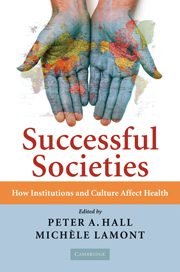Book contents
- Frontmatter
- Contents
- Contributors
- Preface
- Introduction
- 1 Population Health and the Dynamics of Collective Development
- 2 Social Interactions in Human Development: Pathways to Health and Capabilities
- 3 Health, Social Relations, and Public Policy
- 4 Population Health and Development: An Institutional-Cultural Approach to Capability Expansion
- 5 Responding to AIDS in Sub-Saharan Africa: Culture, Institutions, and Health
- 6 Responses to Racism, Health, and Social Inclusion as a Dimension of Successful Societies
- 7 Collective Imaginaries and Population Health: How Health Data Can Highlight Cultural History
- 8 Making Sense of Contagion: Citizenship Regimes and Public Health in Victorian England
- 9 The Multicultural Welfare State?
- 10 From State-Centrism to Neoliberalism: Macro-Historical Contexts of Population Health since World War II
- Bibliography
- Index
4 - Population Health and Development: An Institutional-Cultural Approach to Capability Expansion
Published online by Cambridge University Press: 05 June 2012
- Frontmatter
- Contents
- Contributors
- Preface
- Introduction
- 1 Population Health and the Dynamics of Collective Development
- 2 Social Interactions in Human Development: Pathways to Health and Capabilities
- 3 Health, Social Relations, and Public Policy
- 4 Population Health and Development: An Institutional-Cultural Approach to Capability Expansion
- 5 Responding to AIDS in Sub-Saharan Africa: Culture, Institutions, and Health
- 6 Responses to Racism, Health, and Social Inclusion as a Dimension of Successful Societies
- 7 Collective Imaginaries and Population Health: How Health Data Can Highlight Cultural History
- 8 Making Sense of Contagion: Citizenship Regimes and Public Health in Victorian England
- 9 The Multicultural Welfare State?
- 10 From State-Centrism to Neoliberalism: Macro-Historical Contexts of Population Health since World War II
- Bibliography
- Index
Summary
Health and well-being vary most dramatically across the countries of the Global South. The quest to alleviate misery and deprivation in these countries is both most urgent and most frustrating. Consequently, any effort to analyze the social roots of improvements in population health must consider the dynamics of population health and development in the regions where more than four-fifths of the world's people live: Asia, Africa, and Latin America.
Exploring the social roots of improved population health in the Global South inevitably involves a dialogue with development theory. Two apparently unconnected paradigmatic shifts have recently captured the attention of development scholars and are making inroads into policy debates. The institutional turn in growth theory has shifted attention from levels of investment and getting prices right to the historical processes that generate enduring rules, norms, and organizational structures. The capability approach has provided new analytical foundations for both expanding the definition of development goals and defining the political processes that can legitimately prioritize this expanded set of goals.
This chapter focuses on the intersection of development theory and population health. First, it explores the institutional and cultural roots of improvements in population health. This effort will be undertaken using the broad institutional-cultural approach to population health that characterizes the chapters that make up this volume. Cross-national comparisons of life expectancy and a set of case studies will be the empirical springboard. Second, I hope to make a contribution to development theory.
- Type
- Chapter
- Information
- Successful SocietiesHow Institutions and Culture Affect Health, pp. 104 - 127Publisher: Cambridge University PressPrint publication year: 2009
- 13
- Cited by



